In today’s hyper-connected digital world, email addresses are more than just tools for communication. They are digital fingerprints that can unlock a treasure trove of information. Whether you’re trying to reconnect with a long-lost friend, verify the identity of a new online client, or avoid a potential scam, the ability to search people by email has become an essential skill. This guide provides you with a deep understanding of how to effectively search people by email using both free and paid tools, all while staying within legal and ethical boundaries.
Email addresses often link to social profiles, websites, and public records. When used responsibly, these identifiers can reveal the person’s name, social handles, photos, company affiliation, and even location. While some platforms offer this information openly, others require a bit of savvy and the right tools. Throughout this article, you’ll discover a step-by-step guide on how to carry out email lookups, the best tools to use, real-world scenarios where this skill is useful, and how to stay on the right side of privacy laws.
Email search refers to the practice of using an email address as a primary data point to discover more information about the person or organization it belongs to. It’s a form of reverse lookup where instead of starting with a name or phone number, the email address is the root of your search.
Typically, you can find out:
The process of email search can be as simple as plugging the address into a Google search or as complex as using specialized tools and databases that aggregate public records, social activity, and corporate data. Whether you’re verifying a business lead, performing due diligence, or tracking down a former acquaintance, the ability to run an effective email search can save time and protect you from potential risks.
The effectiveness of an email search largely depends on how actively the email has been used online. Emails associated with social media, forums, blogs, and business directories are more likely to yield results. On the flip side, burner emails or addresses created solely for spam tend to offer little or misleading information.
There are countless practical, professional, and even personal reasons you might want to search for someone using their email address. This method of lookup is powerful because an email address is often unique to an individual or business, acting as a universal identifier across different platforms.
In an age where online scams and phishing attacks are rampant, email search helps you confirm whether the person you’re interacting with is who they claim to be. By examining the digital footprint of an email, you can distinguish a legitimate business partner from a fraudster.
People often lose touch with friends, family, or colleagues over time. If you have someone’s old email address, you might be able to reconnect with them by tracking their updated contact information or social profiles.
Human resource professionals and recruiters often search candidates by email to verify their credentials, social presence, or existing portfolio. It’s a useful tactic for checking authenticity or learning more about a potential hire.
Journalists and researchers use reverse email lookups to track sources, validate tips, or uncover connections between individuals and organizations.
Before entering a business deal or hiring a freelancer, verifying an email ensures the person or company is trustworthy and has an online presence consistent with their claims.
If you meet someone online and are unsure of their legitimacy, an email search can reveal whether they have active social profiles, real connections, or are using fake details.
Using an email address for search can be a first line of defense and a source of valuable insight when conducted properly.
Yes, in most countries, it is legal to search for someone using their email address, provided you’re accessing publicly available data and not violating any privacy laws. However, the line between legal and illegal use can be thin, especially when tools start aggregating sensitive personal data from multiple sources.
When conducting an email search, always check the local and international laws such as GDPR (General Data Protection Regulation) in the EU, CCPA (California Consumer Privacy Act), and others depending on your location. Opt for platforms that explicitly state their compliance with these standards and avoid any service that doesn’t disclose how it sources data.
In conclusion, while the act of searching by email itself is not illegal, the intent and methodology determine whether you’re operating within legal and ethical boundaries. Always act responsibly.
When free tools aren’t enough or you’re looking for more detailed data, reverse email lookup services come in. These tools pull from massive data repositories including public records, marketing databases, and social footprints.
Here are the top services, with HuntMeleads leading the pack:
| Tool | Free Plan | Best Use Case | Integrations | Standout Feature |
|---|---|---|---|---|
| HuntMeleads | ✅ | Professional & Investigative | CRM, Zapier, API | Real-time identity mapping |
| Hunter.io | ✅ | B2B outreach & lead generation | LinkedIn, Sales tools | Domain-wide email discovery |
| Clearbit | ❌ | Sales & CRM data enrichment | Salesforce, HubSpot | Auto-profile enhancement |
| Voila Norbert | ✅ | Freelance outreach | Zapier | Simple and fast UI |
| Snov.io | ✅ | Cold emailing and prospecting | Email tools, CRM | All-in-one lead gen suite |
Best For: Professionals, marketers, and investigators looking for high-accuracy data.
HuntMeleads offers a robust reverse email lookup engine that combines real-time public data, corporate databases, and social signals. It stands out for its accuracy, clean interface, unlimited credits and transparent data sourcing. With advanced filtering, API integration, and affordable pricing tiers, it’s ideal for both personal and commercial use.
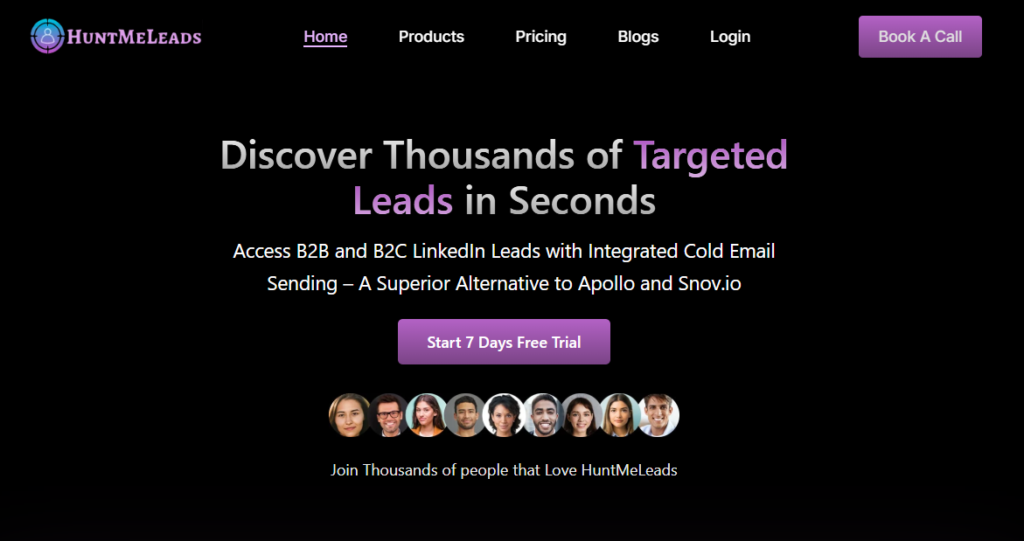
Features
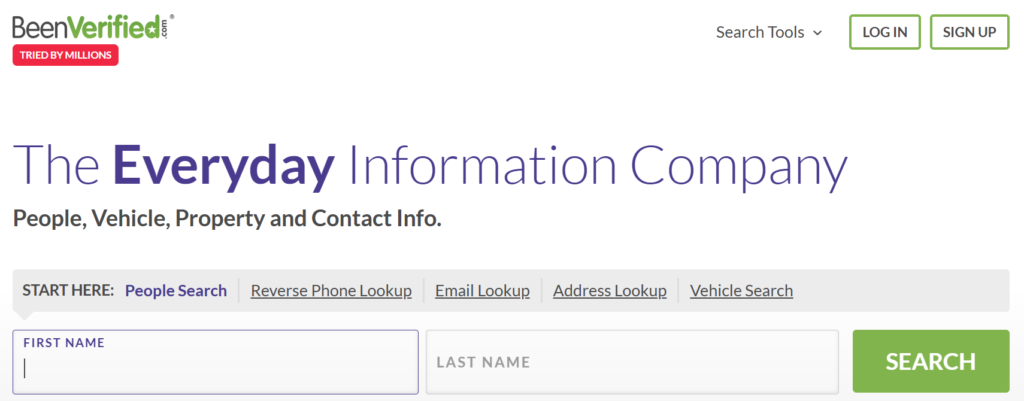
This comprehensive people search engine offers reverse lookups using email, name, phone number, or address. It’s perfect for personal use and even includes background checks and criminal records.
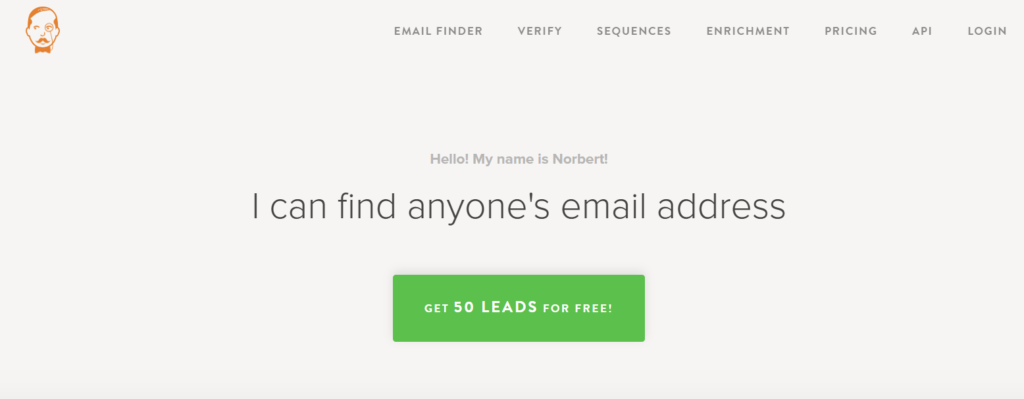
Voila Norbert helps you identify and verify email addresses, with a simple interface and credits-based pricing model. Good for freelancers and small businesses.
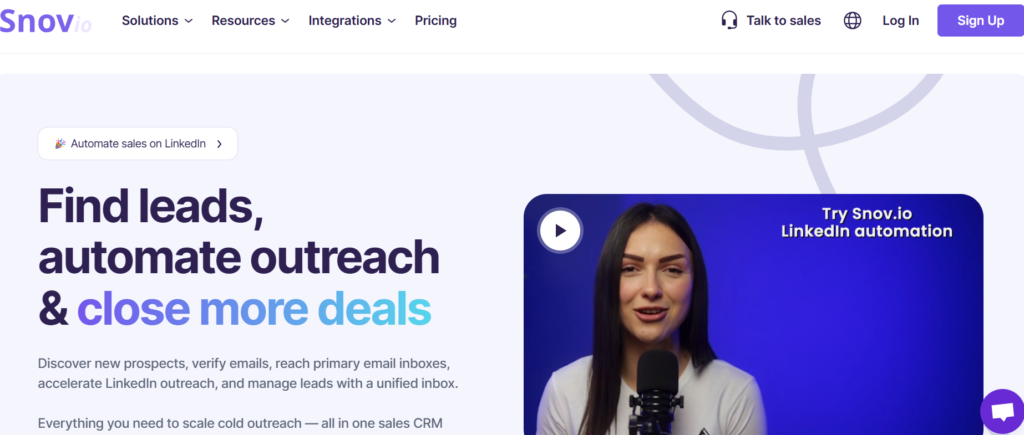
A sales and outreach tool that includes email lookup capabilities. Offers email verification, enrichment, and automation tools for lead generation.
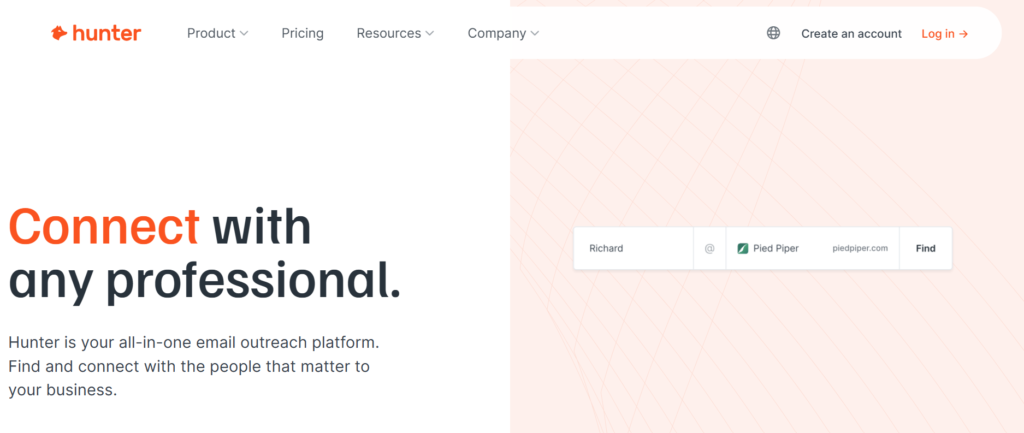
Hunter is a favorite among marketers for verifying professional email addresses and matching them to organizations and LinkedIn profiles. Offers free and premium options.
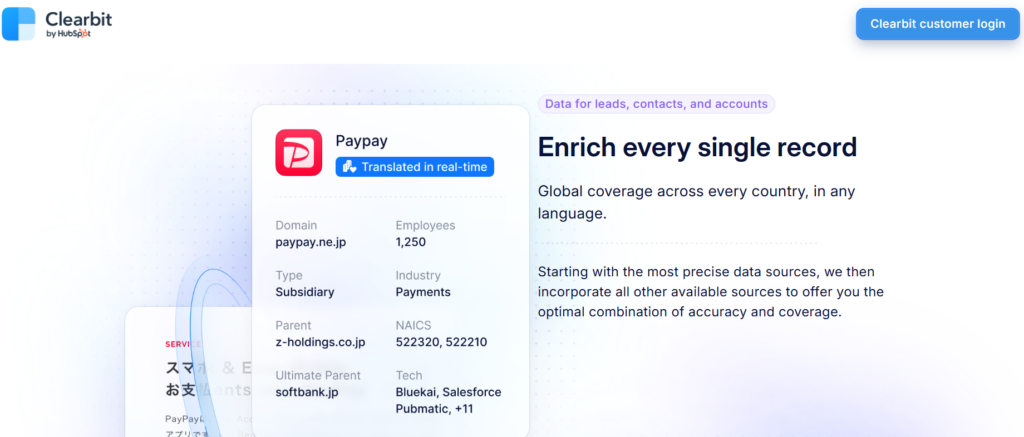
Designed for businesses, Clearbit enriches email addresses with company roles, logos, and social links, ideal for CRM platforms and sales pipelines.
Each of these tools serves different audiences. HuntMeleads provides the best all-around solution for users who value accuracy, privacy compliance, and cost-efficiency.
Before jumping into paid tools, you should explore all available free email search methods, many of which offer surprisingly valuable results. These methods are excellent for casual users and provide a great first step in verifying or researching someone via their email.
The most obvious and often most effective method is simply entering the email into Google. Use quotation marks to find exact matches:
"example.name@gmail.com"You might uncover:
To narrow down results, combine the email with keywords like “LinkedIn,” “GitHub,” or “resume.”
Many social platforms let users find people by email:
Gravatar.com allows users to associate images with emails. If someone uses Gravatar (common among bloggers and WordPress users), entering their email may return their photo and basic info.
Tech communities and open-source platforms often show emails in user profiles or commit histories. GitHub, for example, may reveal names, organizations, or locations tied to an email.
Using these methods responsibly, you can gather quite a bit of information for free before considering premium options.
Reverse email lookup has become an essential tool in both personal and professional contexts. Understanding the variety of use cases will help you maximize the value of email search tools while staying compliant.
Verifying the origin of suspicious emails can protect you from phishing scams. If the sender claims to represent a company but has no traceable identity, it’s a red flag.
Marketers and business developers use email lookups to identify decision-makers, personalize outreach campaigns, and connect with the right contacts.
Freelancers and agencies can use email lookup tools to verify the legitimacy of potential clients and avoid fraudulent projects.
Discovering social handles linked to an email can help understand someone’s interests, behavior, and credibility, which is useful for background checks or building rapport.
Journalists use reverse lookups to validate anonymous sources, uncover hidden connections, and find digital trails of public figures or companies.
Security analysts use email search to identify threat actors, track phishing attempts, and investigate data breach leaks.
From personal protection to professional verification, email lookup tools are powerful assets when used wisely and ethically.
Despite its benefits, reverse email lookup carries inherent risks, especially if used recklessly or without regard for data privacy laws.
Some users may feel their personal information is being exposed without consent. Always use platforms that are transparent about data collection and comply with laws like GDPR.
Not all information retrieved via email search is current or correct. Relying on inaccurate data could damage relationships or result in wrong decisions.
Using email search tools for harassment, stalking, or to access private information can lead to serious legal consequences.
Avoid shady email lookup services that may install malware or phish your personal data. Use trusted platforms with HTTPS and clear privacy policies.
To ensure you’re getting the most value while staying on the right side of ethics and legality, follow these best practices:
Always begin with free tools like Google, social media, and Gravatar. These can often give you enough information without needing a paid service.
Cross-reference findings across multiple platforms to validate the accuracy of the information.
Avoid using lookup tools for stalking, doxxing, or unauthorized surveillance. Always ask yourself: “Would I be okay if someone did this to me?”
Stick with reputable tools and avoid entering personal information on sketchy websites.
Familiarize yourself with local data privacy laws and only use tools that follow compliance frameworks like GDPR and CCPA.
Email search is a versatile and powerful tool for individuals and businesses alike. From enhancing safety and trust to reconnecting with lost contacts, it serves a wide array of use cases. While free methods can provide valuable insights, professional tools like HuntMeleads offer deeper and more reliable results.
Just remember: with great power comes great responsibility. Always search ethically, stay compliant with privacy laws, and respect others’ digital boundaries.
If you’re ready to uncover who’s behind that mysterious email, start your journey with trusted tools — and stay informed, secure, and responsible.
Yes, using reverse lookup tools or a simple Google search, you can often find the person’s full name, especially if they use the email on public forums or social media.
Many offer free versions or limited searches (e.g., Hunter.io, Voila Norbert), but detailed results typically require a paid plan.
Yes, as long as you use publicly available data and comply with local privacy laws.
HuntMeleads is considered among the most accurate and privacy-compliant platforms for reverse email lookup.
No, most reverse lookup tools do not notify the person being searched.
Absolutely. Tools like HuntMeleads and Hunter.io are designed for professionals who need verified contact details and contextual data for outreach and lead generation.
Sometimes, yes. Business-related emails or emails linked to social media may include city or regional information, but exact locations are rarely available without user consent.
Most platforms provide an option to request correction or removal. Always verify results with multiple tools before taking action.
Accuracy depends on the tool’s data sources and update frequency. Paid tools like HuntMeleads typically have higher accuracy than free or outdated directories.
Yes. Some services like HuntMeleads offer bulk lookup and API access, ideal for businesses managing lists of contacts or leads.
WhatsApp us